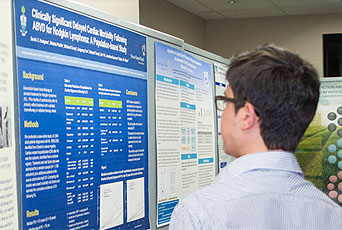
ELLICSR offers a unique and unparalleled opportunity to learn from the knowledge and experiences of cancer survivors and examine new approaches to predict, prevent and manage long-term adverse effects of cancer and its treatment and evaluate innovative models of care delivery and support.
Jennifer Jones, Ph.D.
Director, Cancer Rehabilitation and Survivorship Program ELLICSR Centre for Health Wellness and Cancer Survivorship Princess Margaret Cancer Centre
 ELLICSR houses our research team and innovative self-management research facilities. We offer the opportunity to examine new approaches to predict, prevent and manage persistent and long-term adverse effects of cancer and its treatment, and evaluate innovative models of cancer care and support. Through the generation, exchange and translation of new knowledge into practice, we will achieve our goal to optimize the health and well-being of cancer patients and their families.
ELLICSR houses our research team and innovative self-management research facilities. We offer the opportunity to examine new approaches to predict, prevent and manage persistent and long-term adverse effects of cancer and its treatment, and evaluate innovative models of cancer care and support. Through the generation, exchange and translation of new knowledge into practice, we will achieve our goal to optimize the health and well-being of cancer patients and their families.
By working together, we can improve the overall delivery of cancer care along the entire cancer trajectory, with a particular emphasis on the post treatment survivorship phase.
Our ELLICSR research group is engaged in a number of research activities, including developing and evaluating strategies to: promote patient engagement in self-management health-promoting behaviour; improve quality of life of cancer survivors and their families; assess the prevalence and impact of late and long-term physical, psychological, social and financial effects of cancer and its treatment; improve clinician-patient communication; evaluate new models of cancer care and support, including the use of social networking and personal health information technology.
Goals of the Program
- Make major contributions to improving the health and quality of life of cancer survivors
- Make new discoveries in survivorship, innovate clinical processes, and investigate new models of care delivery
- Positively impact the quality and quantity of survivorship research conducted and survivorship care delivered
- Enable all stakeholders to engage with each other with appropriate clinical guidance
